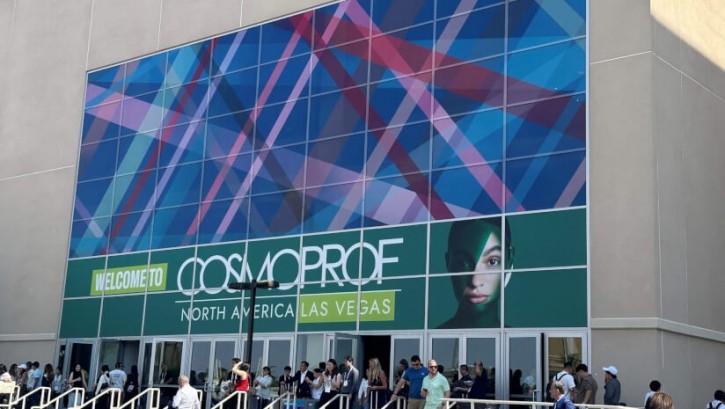© CosmeticsDesign Cosmoprof North America in Las Vegas showcased a vibrant blend of nostalgic brand collaborations, Generation Alpha-focused products, and bold, preppy packaging trends, highlighting the future direction of the beauty industry.
Last week, Cosmoprof North America returned to Las Vegas, bringing together industry leaders, innovative brands, and key stakeholders from the cosmetics and personal care sectors. The event showcases cutting-edge trends and fosters invaluable networking opportunities, and it did not disappoint.
This year’s edition highlighted a dynamic blend of product innovations, emerging market insights, and sustainable practices that are set to shape the industry’s future. CosmeticsDesign walked the busy show floor to provide our key takeaways from the event, including our insights and trend highlights that cosmetics and personal care product manufacturers and suppliers can leverage to stay ahead in an ever-evolving market.
Nostalgic brand and product collabs
The first prevalent trend across skin care, hair care, and nail care is the emergence of nostalgic brand and product collaborations. From a collection of Hello Kitty Gel-X nail products from Apres Nails to fun and fanciful eyeshadows, lip liners, and lip balms with Peanuts cartoon characters from Rude Cosmetics, it’s clear that brands are making a push to connect with Millennial consumers by incorporating nostalgic and iconic imagery into their product collections.
Also spotted on the show floor this year were Strawberry Shortcake pimple patches and Nascar and Barbie-themed face masks. This trend extends beyond the event, as seen with brands like Mooncat, whose recent Mooncat x Powerpuff Girls nail polish collection also capitalizes on nostalgic themes. Integrating beloved characters and themes from the past is proving to be a powerful tool in capturing consumer interest and driving engagement.
Gen A leads the way
The second dominant trend at this year’s Cosmoprof event in Las Vegas is the emergence of Generation Alpha-focused brands. Those in Gen A range in age from 14 to infants, but there are already multiple brands focused on addressing the specific needs of this emerging demographic of young consumers.
For example, the dermatologist-founded brand Bright Girl, whose skin care product collection is designed for ages 8-20, includes masks, cleansers, and sunscreens, emphasizing colorful and appealing packaging and simple, clean product formulations for its target audience.
In the hair care space, Niles + Chaz Pizzazz is a “kid-approved” brand focused on meeting the needs of children with mixed-textured hair. Product formulations contain over 90% naturally derived ingredients, and options like detangler, frizz cream, and curl reviver spray specifically address common hair care concerns for children with hair that can be difficult to manage. Like Bright Girl, Niles + Chaz Pizzazz also emphasizes bright and colorful packaging to be more desirable to its main consumer base.
Finally, in the color cosmetics space, Talomi has emerged as the “Worry-Free Makeup for Your Tween.” Available in a range of pink to red hues, Talomi has developed a collection of multifunctional balms that can be used on the eyes, lips, and cheeks and is made from non-comedogenic plant-based ingredients specifically for sensitive tween skin. Designed to fill the white space between play makeup marketed for younger children and cosmetics formulated for older teens, the Talomi brand is working to fill the gap for tweens looking to start experimenting with makeup while simultaneously being “mom-approved.”
This trend towards Generation Alpha-focused brands highlights the industry’s recognition of this emerging consumer group. With products tailored to their unique needs and preferences, these brands are setting the stage for long-term customer loyalty from an early age.
Packaging: Pretty & preppy
Across all beauty sectors at the Cosmoprof North America show, pretty and preppy packaging was well represented. Featuring bright and bold colors and clean white font, it’s evident that the millennial pink packaging of recent years is declining in favor of packaging that draws its inspiration from brands like Drunk Elephant.
In the skin care space, for example, Timeless Skin Care’s packaging is colorful and confident across all of its product collections, including its serums, eye creams, and sprays. Similarly, Oli G hair care’s packaging is available in a rainbow of rich and beautiful colors and sleek bottle shapes with clear and clean caps for a polished look appealing to younger consumers.
pH-In Acne Care also embodies this trend, as its packaging features bold hues and a smooth matte finish. This shift towards more vibrant and polished packaging indicates a broader industry move to attract attention on crowded shelves and appeal to a visually driven consumer base, and brands are recognizing the importance of packaging design in creating a strong first impression and enhancing the overall product experience.
From nostalgic brand collaborations and Generation Alpha-focused products to the shift towards pretty and preppy packaging, these trends reflect the industry’s adaptability and responsiveness to consumer demands. As manufacturers and suppliers navigate this evolving landscape, staying attuned to these emerging trends will be crucial in maintaining a competitive edge and meeting the diverse needs of modern consumers.

